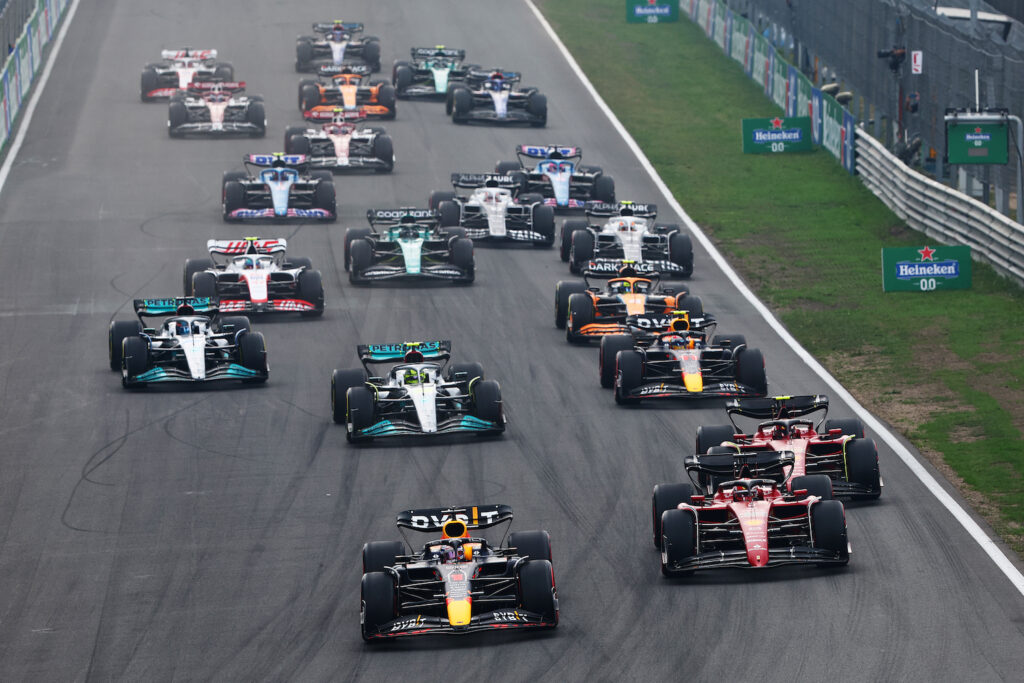
ZANDVOORT, NETHERLANDS - SEPTEMBER 04: Max Verstappen of the Netherlands driving the (1) Oracle Red Bull Racing RB18 leads Charles Leclerc of Monaco driving the (16) Ferrari F1-75 and the rest of the field into turn one at the start during the F1 Grand Prix of The Netherlands at Circuit Zandvoort on September 04, 2022 in Zandvoort, Netherlands. (Photo by Mark Thompson/Getty Images)
Audience
- Sentiment: Concerned
- Political Group: Progressive
- Age Group: 25-45
- Gender: All genders
Overview
- DRC urges Formula 1 to reconsider hosting a grand prix in Rwanda due to ongoing regional conflicts and humanitarian crises.
- The DRC’s Foreign Affairs Minister questions if luxury events align with the realities faced by affected communities.
- Wagner suggests South Africa as an alternative for hosting the event, emphasizing stability and cultural richness.
Title: DRC Urges Formula 1 to Rethink Rwanda Grand Prix Talks Amid Ongoing Conflict
Formula 1 racing is a thrilling and fast-paced sport. It draws in millions of fans from all over the world, all excited to watch sleek cars zoom around tracks at breakneck speeds. But amidst all that excitement, there are some serious thoughts to consider about where these races are held and what they mean to the people living in those areas. Recently, the Democratic Republic of Congo (DRC) made headlines by urging Formula 1 to rethink its plans for a grand prix in Rwanda. Let’s dive deeper into the details of this situation, why it matters, and how it connects to larger themes of conflict and community.
Understanding the Context
First, let’s clarify what the DRC’s concerns are. The DRC and Rwanda have a complicated backdrop that involves regional conflicts and humanitarian crises. For many years, there have been issues between the DRC and Rwanda, particularly in the eastern regions of the DRC, where violence has resulted in many people fleeing their homes and living in dire conditions.
Recently, the DRC’s Foreign Affairs Minister, Thérèse Kayikwamba Wagner, conveyed her worries in a letter to Formula 1 CEO Stefano Domenicali. In that letter, Wagner indicated that it’s hard to justify hosting a glamorous event like a Grand Prix in a country that is engaged in military actions that significantly harm its neighbors, especially when innocent civilians are suffering as a result. This raises important questions about what values brands like Formula 1 should uphold. Should they only look at profit margins and entertainment, or should they also consider the social implications of their actions?
What Does It Mean for Formula 1?
When we think of Formula 1, we usually imagine high-speed cars, wealthy teams, and international fans. But like any business, Formula 1 has to think carefully about its reputation. If they choose to hold a grand prix in an area experiencing severe conflict and hardship, it might not only seem insensitive but could also alienate fans around the globe who are passionate about social justice and compassionate action.
Wagner’s concerns were substantial. Beyond economic investment and race track excitement, she questioned whether a lavish sport like Formula 1 — often viewed as emblematic of luxury — aligns with the harsh realities faced by many people in the region. This is where it gets tricky. Sporting events can bring positive attention and tourism to a country, but at what cost? For many, it may feel wrong to celebrate while the lives of so many are affected by conflict.
The Humanitarian Perspective
To really understand the weight of Wagner’s letter, let’s take a moment to explore the human side of these conflicts. In the eastern DRC, many innocent civilians face realities that are far removed from the thrill of a car race. Families endure threats from armed groups, and many children in these regions have to grow up in fear. Hospitals often lack resources, schools may become unsafe, and basic necessities like food and clean water can be difficult to come by.
Imagine living in such conditions; it’s hard to picture how anyone could feel like hosting a major sporting event is a priority. If F1 were to go ahead with the plans for the Rwanda Grand Prix, it could come across as prioritizing profit over human life. As fans of the sport, we might need to think about how these events can impact communities, sometimes fostering a sense of division instead of unity.
Other Options: Why South Africa?
In her letter, Wagner proposed that instead of Rwanda, Formula 1 should consider a bid from South Africa. This suggestion held several layers of significance. South Africa boasts a rich and diverse culture, stunning landscapes, and a history tied to resilience and social change. Hosting a Grand Prix there could potentially highlight the country’s achievements and inspire unity.
South Africa has previously hosted numerous major sports events, including the FIFA World Cup in 2010, which brought the world’s attention to their ability to host grand events effectively. Unlike hosting these events amidst military conflict, South Africa offers stability and the potential for economic growth through responsible tourism. This makes sense on many levels. Formula 1 stands for speed, innovation, and excellence, and a South African Grand Prix might better reflect these values while fostering a positive image for the sport.
Formula 1’s Response
Formula 1 has acknowledged the concerns raised by Minister Wagner. They stated they are closely monitoring the situation and will make decisions that consider the best interests of the series and its core values. This hint at thoughtful consideration is reassuring but also leaves room for questions about what those core values truly are.
In an interconnected world, brands and organizations must recognize that the choices they make can have profound impacts on people’s lives. As fans, we can support F1’s commitment to positive decision-making and to align more closely with the values of compassion, integrity, and respect for human rights.
Final Thoughts: The Power of Discussion
As we follow these developments, it’s important to think about our roles as fans and consumers. Do we want to support events that might encourage division and strife, or do we want to back those that can uplift communities in need? The case of the DRC urging Formula 1 to rethink its plans for a grand prix in Rwanda is a reminder that every choice we make — from the sports we watch to the products we purchase — reflects our values.
So, why does this matter to us? First, it encourages us to be informed and critical thinkers when it comes to global issues, reminding us to be engaged members of society. Whether it’s about sports, politics, or anything in between, understanding the implications of our entertainment is crucial.
Now, it’s your turn to weigh in! What do you think about Formula 1’s potential grand prix in Rwanda? Should they reconsider and look at South Africa instead? Do you believe sports should play a role in social issues? Share your thoughts with us in the comments below! Your view matters, and who knows? It might just inspire others to think more deeply about these important issues!




